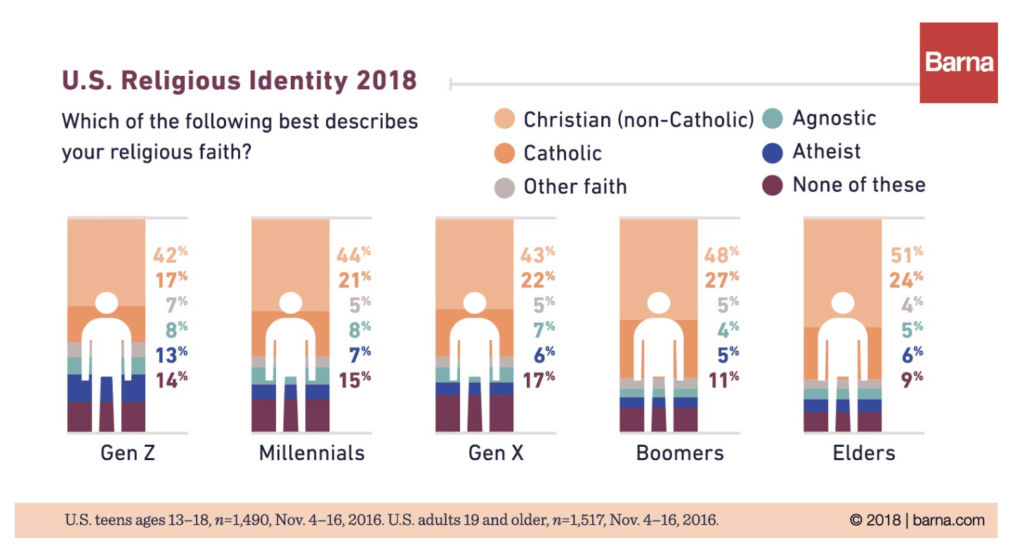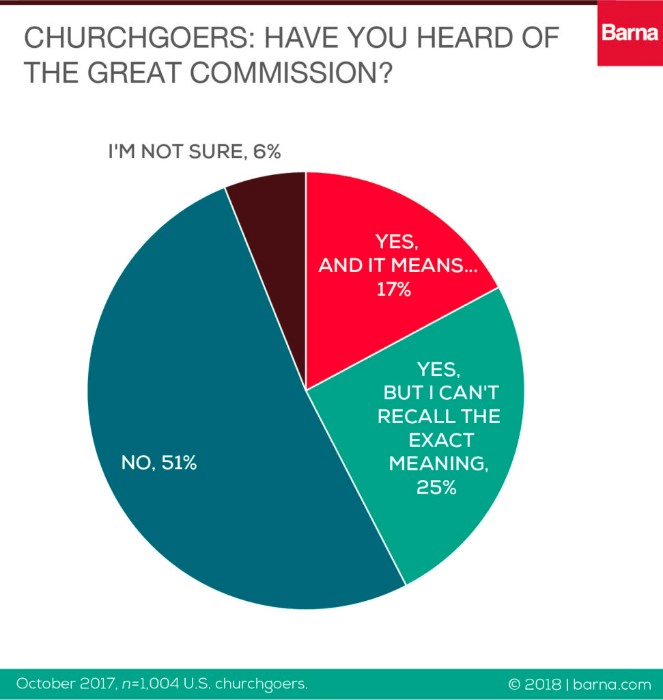It’s no secret that churches have been struggling to reach millennials. Younger generations don’t want to go to church, they don’t want to be associated with Christianity, and they’re not interested in personal evangelism.
But what does it mean for the church’s future if the next generation of Christians isn’t interested in sharing the gospel message and inviting people to church? And are millennials really done with personal evangelism? Let’s take a closer look at the stats, and talk about five ways leaders can strengthen evangelistic ministry in our churches.
Estimated reading time: 9 minutes
Table of contents

Do Millennials Feel It’s Wrong to Share About Jesus Christ?
Barna research found a significant difference between millennials and other generations of Christians when it comes to evangelistic efforts: 47% of millennials felt it’s wrong to share your beliefs with someone of a different faith in hopes they will someday share your faith.
Only 27% of Gen X, 19% of Boomers, and 20% of Elders agreed with this statement. So there appears to be a generational shift in attitude. Although that looks like bad news, the study also reports other encouraging statistics, such as:
- 94% of millennials agree that the best thing that could ever happen to someone is for them to come to know Jesus.
- 96% of Millennials felt that part of their faith means being a witness about Christ Jesus.
- 86% of millennials felt confident they know how to respond if someone raises questions about faith.
So there appears to be a disconnect. Millennials know the word of God and we see God growing them individually, but do they feel a responsibility and desire to share this hope? Or do millennials define evangelism differently? Let’s explore some possibilities.

3 Reasons Millennials Shy Away From the Word Evangelism
The word evangelism is defined as the act of sharing the gospel with someone who doesn’t already know Christ. It involves an announcement, proclamation, or communicating the gospel of salvation through Jesus.
But the modern methods and techniques people use to share God’s word and evangelize may differ from this simple biblical definition of sharing faith. And that could be where the disconnect comes in. Here are three reasons millennials may be cautious about evangelism.
Recent Evangelistic Tactics Are Often Ineffective
Have you ever seen a sidewalk preacher yelling at passersby through a bullhorn that they need to believe in Jesus or burn in hell forever? They may be shouting Bible verses, but without displaying any of God’s love. These individual Christians are not a good example of spreading the gospel of Christ. But, unfortunately, this is what comes to many people’s minds.
Or, they may think evangelism requires striking up conversations about their deeply held religious beliefs with a complete stranger. I’m sure you’ll agree: most people aren’t comfortable approaching a person with this agenda. No wonder people would say nope, that’s not for me!
Evangelism Can Be Interpreted as Offensive
Have you ever been on the receiving end of an aggressive come-to-Jesus sales pitch? It’s not a pleasant personal experience. Many millennials fear that trying to “witness” to people might seem offensive, hypocritical, and condescending. And most millennials can’t stomach (even the possibility of) coming across that way. And they also fear exposure and ridicule on social media – something other generations didn’t have to deal with.
We live in a culture that’s increasingly sensitive to real or perceived offense. Most Christians, especially younger generations, don’t want to appear judgmental, intolerant, or close-minded. Not everyone feels the same way, but this is a real challenge for sharing the truth of God in this day and age.
The Barna study also shows that 40% of millennials felt that if someone disagrees with you, they’re judging you. Only 9% of Boomers and 11% of Elders agreed with that statement. Hence, millennials are more likely to avoid conversing about God or the importance of making Jesus Lord of your life if someone might disagree with an answer.
They Don’t Know the Great Commission is For Them
In Matthew 28:19-20, Jesus tells his disciples to “Go therefore and make disciples of all nations, baptizing them in the name of the Father and of the Son and of the Holy Spirit, teaching them to observe all that I have commanded you.”
These last words in Matthew’s gospel are known as the Great Commission. This is the call to all the disciples (including us) to be a faithful witness and spread the gospel. Sharing God’s message of salvation with the whole world has been a cornerstone of the Christian faith for generations. It’s what we see the early church doing throughout the New Testament.
However, other Barna research has shown that over half of churchgoers haven’t heard of the Great Commission. And only 17% know what it means. Perhaps part of the reason millennials don’t share about God’s salvation with non-Christian friends is that they don’t have a biblical foundation.

Effective Personal Evangelism for the Future
Millennials may not be as active in organized religion as previous generations, but that doesn’t mean they’re done sharing about God. The problem is that they don’t necessarily see traditional forms of evangelism—proselytizing, preaching, etc.—as being effective. And frankly, who can blame them?
But there are plenty of ways for Christians—millennials included—to share their faith without resorting to outdated or pushy methods. Here are just a few ideas to create a strong culture of evangelism in your church.
1. Teach on Biblical Evangelism
Remember the stat that only 17% of people being able to explain what the Great Commission means? That should be enough to convince you we need more teaching on this subject in our churches! The Bible is full of examples and stories about evangelism, so start with some Bible study on what it means to follow the Lord Jesus and share the personal work God has done in your life. Think about the Samaritan woman at the well, the book of Acts, and other teachings in the New Testament.
Be sure to cover the subject thoroughly, including what, when, where, why, and how to evangelize. You can also share scriptures and stories of evangelism throughout church history. Also, you can demonstrate how other Christians’ methods of sharing the love God has for us have varied across times and cultures.
2. Model How to Share Jesus Christ
The best way to teach someone something is by modeling it for them. So don’t be afraid to open up about how you share your faith and encourage others to do the same. One of the best ways to evangelize is simply by sharing your own story of how you came to know Christ. Your testimony has power, and it’s a great tool for conversation.
Evangelism isn’t about winning an argument or forcing people to divulge all the sin in their life. It’s about sharing the gospel and Jesus Christ while also taking time to listen. And you can simply pray and let the Holy Spirit lead you to co-workers, neighbors, or family members. Then, share your story.
3. Foster Authenticity and Engagement
Millennials are more likely to connect with real people than perfectionists with all the correct answers. So be sure to create an atmosphere of authenticity that encourages people to engage in meaningful conversations, ask questions, and explore their faith. We live in a skeptical world, but openly speaking about doubts and questions lets people know your church is safe. It also shows them that you’re not perfect and still learning—just like them!
Christians should always strive to be authentic and genuine in their interactions with others. This means openly sharing the gospel’s unbelievable news while respecting others’ beliefs. It also means living as a Christian in word and deed, in everything you do—even when no one is watching.
4. Create Opportunities to Serve Others
Millennials are passionate about serving their community and the world around them. Seeing how their service can be a platform for witnessing and sharing the love of God makes it all the more attractive.
Find ways your church can serve in the community, like food banks, soup kitchens, homeless shelters, etc. When you serve others selflessly and with no strings attached, it speaks volumes about what Christianity is all about and can start a spiritual conversation.
5. Embrace Technology
Millennials are digital natives who have grown up with technology integral to their lives. So don’t be afraid to embrace it in your evangelistic efforts to share the gospel. Create a website and social media presence for your church that’s active, engaging, and inviting. Use these platforms to share stories of how God is at work in the lives of those who attend.
You can also create digital tools like Bible reading plans or prayer journals that help others grow in their faith. Millennials and Gen Z have shifted their communication style. It’s often more natural for them to share a social media post or video or text a prayer than engage in a long conversation.
Letting the Holy Spirit Lead People to Eternal Life
As Christians, we have to understand that personal evangelism is not just for a select few in full-time ministry. We’re all called to share the good news of Jesus and the love of God with a hurting world. People cannot hear the gospel and make sense of its truth unless someone first shares the message. But don’t put pressure on yourself for the saving – God will take care of that part!
You may not consider yourself an evangelist, but God calls all believers to be witnesses. As church leaders, we need to remind ourselves and others to share the good news of Jesus with believers and non believers alike as we walk out our daily life.




